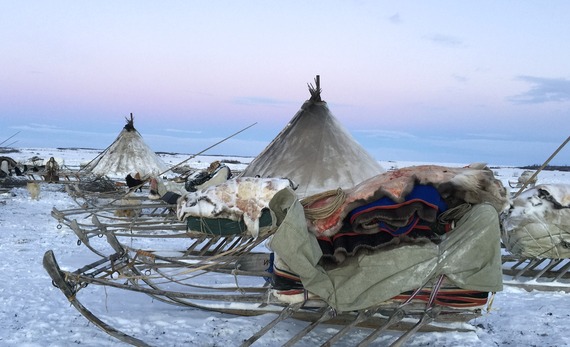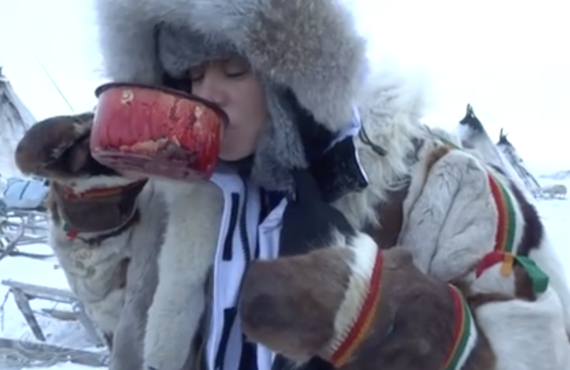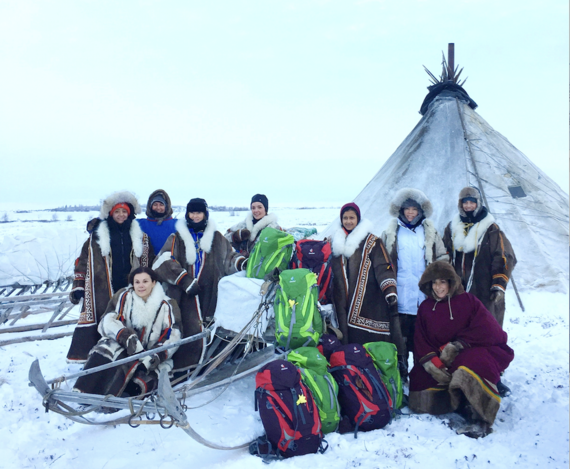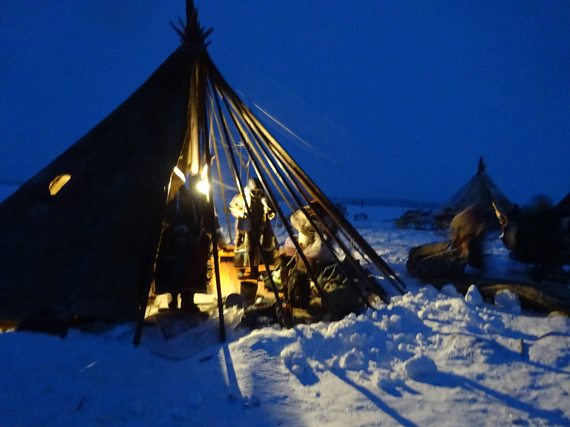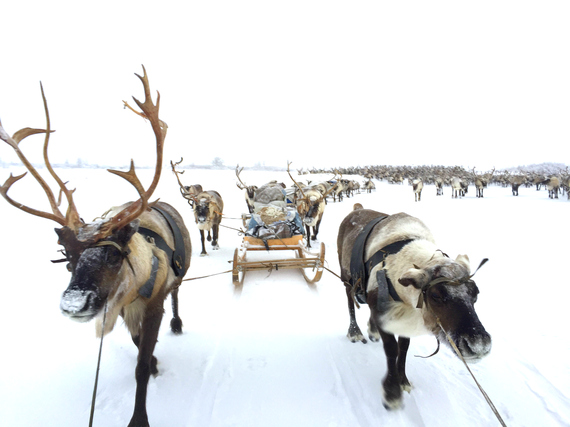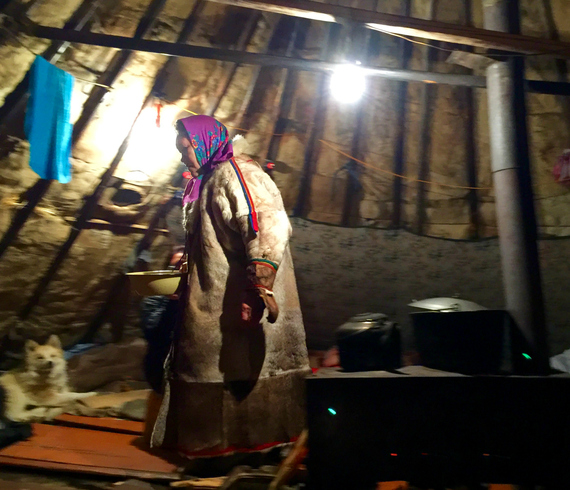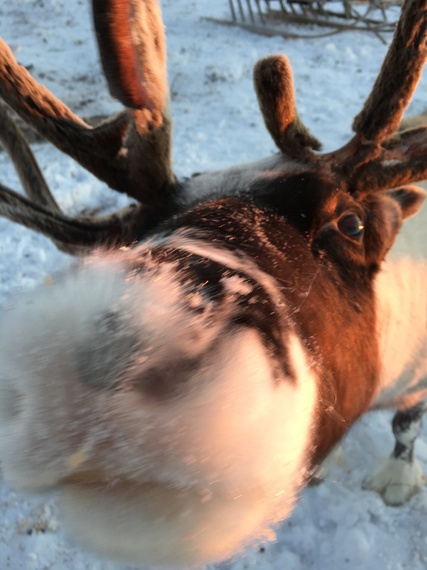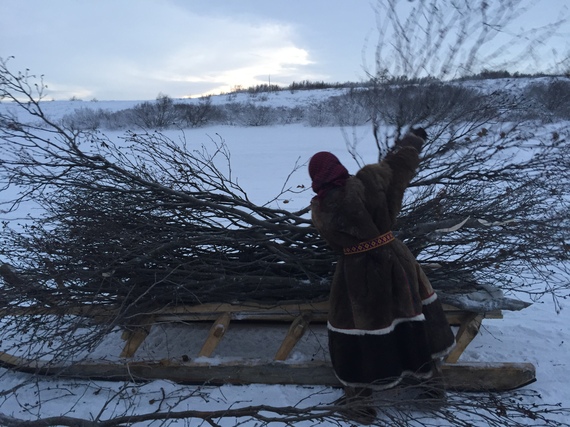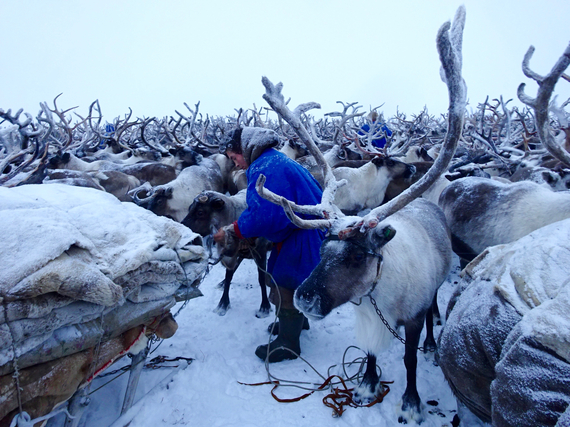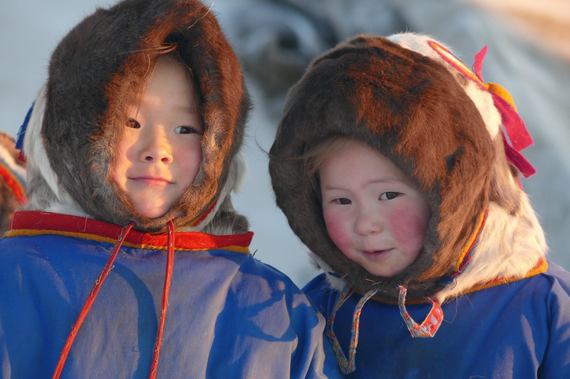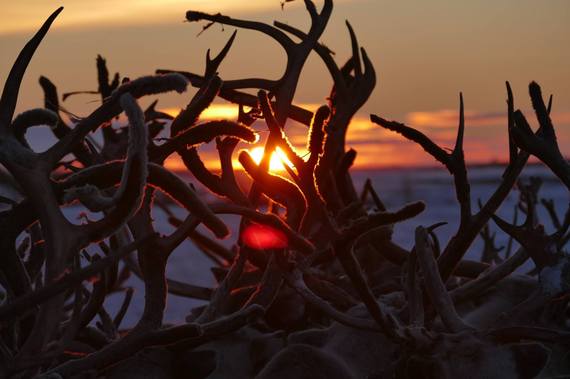Its head facing east, the animal's eyes bulge out and its tongue hangs limply to one side as the rope around its neck, pulled by three broad-shouldered herders squeezes the remaining life out of it. Slowly its resistance weakens, its eyes are fixed on a point in the Arctic sky above, then suddenly, complete stillness. For centuries, the Nenets of Siberia have been living off reindeer meat and blood, utilizing every inch of the animal from hide to heart, to bone and antlers even -- nothing is ever wasted.
As soon as the animal is dead, the hide is meticulously removed and kept in one piece to be used for clothing. Then the feasting begins, and everyone starts to tear out pieces of kidney, liver, heart, or whatever parts they most enjoy, occasionally dipping and swirling the bits in the open carcass, which still holds the reindeer's warm blood. A small saucepan containing blood is passed around, and each one takes a turn to have a drink.
When it's my turn, I hesitate just for a moment. I grab the dripping saucepan, take a couple of small gulps and swirl the warm blood around my mouth to show that I appreciate the full flavor. It tastes salty and not at all unpleasant. I'm certain my eagerness to try these newfound treats is fueled by the fact my "Women On A Mission" teammates and I feel extremely privileged to accompany these exceptional people during a portion of their epic yearly migration across the frozen gulf of Ob, in northern Russia.
We are a team of nine women from Singapore, Dubai, London and Kuala Lumpur and ultimately, we've embarked on this adventure to raise awareness and funds for women survivors of war. By trekking in such hash conditions, we hope to inspire women to leave their comfort zone, their families and homes for a certain period of time, while pushing their limits in an effort to rally support for a worthy cause. Even if we could never claim to truly understand the suffering survivors of war go through, by doing something challenging, so alien to our own way of life, and dedicating it to these brave women, we believe we are standing in solidarity with them, and it gives us strength as we face the howling Arctic winds and debilitating temperatures of Siberia.
The Nenets of the Yamal Peninsula are among the world's oldest surviving true nomads. They are guardians of a style of reindeer herding that is the very last of its kind. In their language, 'Yamal' means 'the end of the world' and indeed, as we journey with them in this vast Arctic desert, along with their gigantic reindeer herds, we feel as if we are pioneers, standing at the very edge of humanity's first settlement.
On migration days, we are up at four a.m. helping the women dismantle the camp and load their belongings on the sledges, while the men go off to lasso the specially trained transport reindeer from the main herd. Once the reindeer are harnessed to each of the sleighs, the tribe is ready to go. Then begins the 20 to 25km journey to the next encampment, with the sleighs forming a 2km-long convoy snaking its way across the frozen landscape.
We won't eat or drink all day, or at least until the new camp is set up. It's overcast and so dreadfully cold. When the wind picks up and the snow begins to swirl violently around us, the temperatures plummet to minus 36 degrees Celsius. We are grateful for the reindeer fur coats and thigh-high boots the Nenets have lent us. However, in these extreme conditions, despite the many layers we wear, our extremities begin to feel dangerously numb. The biggest risk, as we spend close to 10 hours without shelter, is frostbite and hypothermia. We are aware that if our body's core temperature drops by just one or two degrees, hypothermia can set in, thus we keep a watchful eye on each other throughout the day for any early warning signs.
Once the camp is finally set up, it's time for warm tea and a feast of frozen fish and bread is laid out in front of us as we all pile eagerly into the chums (traditional conical tents made of reindeer hides) to warm up. Antonina, Yuri's mother, brings out the vodka, while the family's nine dogs curl up on the furs around us, watching expectantly for any scraps. She then begins to tell us about the rules. "In Nenets culture women have a lot of mystical powers," she begins. We are elated to hear this, then quickly realise there's more to it. "Anything to do with the birth-giving area of a woman's body can be harmful and is considered somewhat of a taboo," she explains.
We soon discover the laws of the tribe, as it relates to women: We are not allowed to step over men or any of their tools. If we come across one of the men's lassos or tools on the ground while walking through the camp, we must always walk around it and never over it, lest we incur horrible bad luck for the whole tribe. Additionally, we cannot cross or put our hand through the invisible line, which goes from the center of each chum all the way to the back of the tent and extends another 100 meters outside. Toileting activities have to be carefully conducted out of sight of any of the men, which in itself is a real challenge given the Nenets men are in constant motion, coming in and out of the camp from any side and at any time.
Additionally, the landscape around the camp is for the most part completely flat, thus our trips to the "toilet" turn into real treks of 200 to 300 meters or more, sometimes in knee-high snow. Furthermore, despite carefully planning our toileting expeditions with great precision and strategy, we discover, to our horror, that the reindeer crave the salt in our urine! Thus they constantly shadow us like ninjas and pounce on us when we are at our most vulnerable, with pants down, clinging without any success to the last shred of our dignity.
Other camp activities include chopping wood, in order to keep the stoves in the chums burning and drawing water through a manmade hole and pulling it back to camp on a sleigh. The work is constant and yet when we look up on occasion and take in the magnificent scenery around us, we are reminded of the extraordinary journey we are experiencing and drink in this otherworldly landscape, which keeps us quite literally spellbound.
Living with the Nenets is truly an unprecedented honor. As of today, just a handful of people have ever experienced travelling with them. We are in fact the largest group they've ever hosted and certainly the first all-female team to journey with them during a migration. And as the days go by, we learn to appreciate the tranquility of the boundless empty spaces, while the deafening silence of the frozen tundra keeps us suspended in time. The dramatic sunrises and sunsets are unforgettable; even if we often confuse the two, given the days are so short.
Despite the harshness of the environment, we adapt surprisingly well to our new way of life, but it's also because the Nenets are so hospitable, treating us like their daughters, making sure we are warm and well fed at all times. Yuri's pregnant wife Elena sees that I'm am about to step out of the chum to go herding with the men, who have made an exception by inviting our women's team to see how they move 10,000 reindeer across the tundra. I can't find my balaclava -- essential to avoid frostbite when riding on the snowmobiles to reach the herd. Elena quickly pulls off her own embroidered scarf and ties it tightly across my face to make sure the skin is protected, while whispering words of motherly concern in the Nenets language, as I run out.
Undoubtedly the proud Nenets people have cast a beautiful spell on us. The contrast with our comfortable, materialistic lives could not be more extreme. And despite the fact their world now also incorporates some modern items such as phones, generators and snowmobiles, their way of life remains pure and in many ways far richer and more meaningful than ours. By sharing the simplicity of their existence, the Nenets remind us of the importance of community and family for survival. Needless to say, as a result, this humbling experience will count as one of the highlights of our lives. The noble Nenets people of Siberia will remain in our hearts, unforgettable.
Women On A Mission (WOAM) is an non-profit organization headquartered in Singapore, that combines challenging self-funded expeditionary travel to remote locations around the world, with the support of humanitarian causes. This Siberia expedition had for objective to raise funds for Women for Women International -- an independent humanitarian organization, which provides women survivors of war, civil strife and other conflicts with tools and resources to move from crisis and poverty to stability and self-sufficiency.
Photo Credit: WOAM
Expedition Partners: Secret Compass
